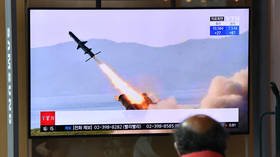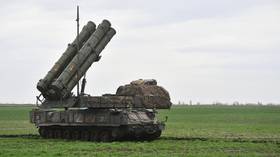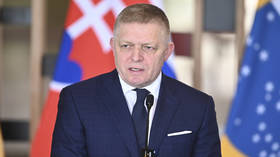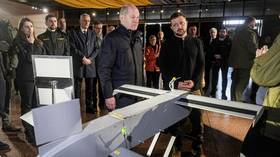North Korea is setting up a post-Covid-19 gambit by staging missile launches while everyone is busy

North Korea has been test-firing ballistic missiles on a scale that suggests 2020 will be its busiest year of testing. But is this recent show of force mere muscle-flexing, or does Pyongyang have something greater to gain?
While most countries have been working on coping with the fallout from the Covid-19 crisis, North Korea has been busy test-firing ballistic missiles over the past few months, with March being a notably busy month. Just this Tuesday, North Korea fired off a barrage of missiles from the ground, in an usual show of force which also saw fighter jets firing an unspecified number of air-to-surface missiles along the country’s east coast.
Analysts are trying to put their finger on the reason behind North Korea’s increased missile activity, particularly during the current pandemic. The main argument visible in most media seems to be that, given the economic woes facing North Korea (even before the coronavirus crisis), the North has to demonstrate its strengthened military capabilities if it is to successfully consolidate power and increase morale in the country.
There are a few notable things, however, we can deduct from the evidence to hand. Firstly, the majority of launches in March landed in the Sea of Japan (known in the Koreas as the East Sea). Japan, as we know, is host to tens of thousands of US troops, so it could be that Pyongyang is sending a direct message to its counterpart in Washington.
Secondly, the North has been testing advanced rocket launchers capable of firing multiple rockets. In fact, in its launch of March 20, the missiles appeared to resemble those of the US Army Tactical Missile System, which can fly low, are difficult to detect and are just as problematic to intercept. It is becoming increasingly clear that, under a barrage of these missiles, the US and South Korean missile defense systems would struggle significantly to shoot them all down.
Most remarkabe, however, is that the recent tests show that, even during the moratorium on long-range missiles and nuclear tests, Pyongyang has continued to successfully develop its missile technology to great effect.
The dire need for sanctions relief
Pyongyang has called the pandemic a threat to its “national survival.” Indeed, the Covid-19 crisis has done the dirty work of the US government to a greater extent than the US government could ever hope to do itself.
While the US has punished North Korea with sanctions for decades, and has not relented during the pandemic, China has routinely intervened to assist the reclusive state in bypassing these sanctions. With the North relying on China for more than 90 percent of its trade, this is no longer a viable and reliable tool to weather Washington’s sanctions regime in the face of the closure of borders.
At the start of April, the UN special rapporteur on the right to food released a statement calling for the lifting of sanctions on a number of economies, including North Korea’s, stating it was a matter of “humanitarian and practical urgency.”
This particular UN expert is apparently not too well-versed in the art of appealing to Donald Trump’s senses and sensibilities (if he has any), as the idea that North Korea could suffer a humanitarian crisis is unlikely to swing him one way or another.
Also on rt.com Fox News reporter generously adds N. Korea and ‘maybe Russia’ as intended audience of Pentagon's B-52 'elephant walk' in GuamNorth Korea: Expect the unexpected
The mainstream media has for years portrayed North Korea as a derelict state run by an inept (and slightly wild) leadership. However, oversimplifying North Korea’s position in the world and how it came to be the state it is today fails to do justice to the bargaining power that North Korea truly has.
During the Korean War armistice talks, the North and South agreed that each side would be represented by three countries. The North chose Poland and then-Czechoslovakia but, in what eventually became a red herring, was hesitant to choose a third. It was only at the last minute that the North chose the Soviet Union, putting the US into a state of shock and panic. The North Koreans eventually agreed to choose an alternative country to appease the other side, but only if the South agreed to waive restrictions on rebuilding airfields. It turns out the North needed its airstrips to fly planes off, whereas the South could utilize aircraft carriers instead.
In other words, the North introduced an item out of nowhere to make concessions with – in order to get the UN to agree to concede an issue which really mattered to them.
A rarely discussed fact of history, yet seems to me to be increasingly relevant as time goes on. What if the North isn’t a crazy, rogue state thumping international waters with missiles but is merely using the tools at its disposal to create bargaining issues over which it can concede at a later date?
If it is true that Donald Trump recently wrote another letter to Kim Jong-un offering cooperation during the coronavirus crisis, then perhaps the North isn’t just flexing its muscles for the sake of it. At the end of the day, we all know the bargaining points Pyongyang truly cares about, moving forward: sanctions relief and an end to the threatening military movements on North Korea’s borders. We also know that the North would be willing to even put its nuclear weapons on the table as a bargaining gambit to achieve those ends.
If Donald Trump was as great a negotiator as he thinks he is, he could have figured this out years ago. Which is why I suspect the underlying goal of the US isn’t to “denuclearize” the region, but to overthrow Kim’s government and acquire trillions of dollars’ worth of minerals in the process.
Think your friends would be interested? Share this story!
The statements, views and opinions expressed in this column are solely those of the author and do not necessarily represent those of RT.















